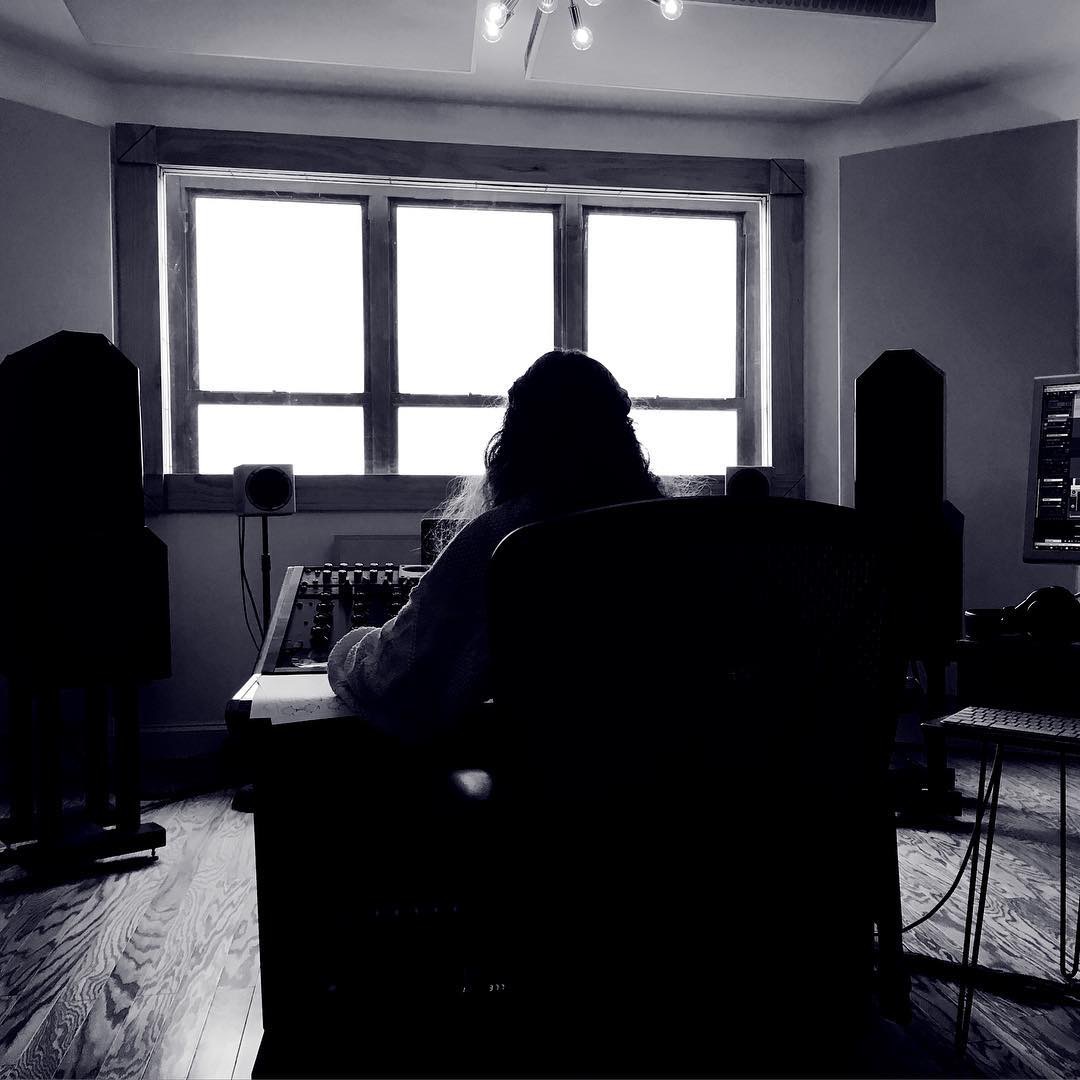#mastering

#mastering

#streethockey

#sunset #fenway

I’ve shared an example iOS project on Github that demonstrates how to use the audioProcessingTap property on AVPlayer to process music in the iPod Music Library. I cribbed liberally from Chris’ Coding Blog, NVDSP, and the Learning Core Audio Book.
Chris’ Coding Blog shows how to set up the audioProcessingTap with an MTAudioProcessingTap struct, and in his example he uses the Accelerate framework to apply a volume gain:
#define LAKE_LEFT_CHANNEL (0)
#define LAKE_RIGHT_CHANNEL (1)
void process(MTAudioProcessingTapRef tap, CMItemCount numberFrames,
MTAudioProcessingTapFlags flags, AudioBufferList *bufferListInOut,
CMItemCount *numberFramesOut, MTAudioProcessingTapFlags *flagsOut)
{
OSStatus err = MTAudioProcessingTapGetSourceAudio(tap, numberFrames, bufferListInOut,
flagsOut, NULL, numberFramesOut);
if (err) NSLog(@"Error from GetSourceAudio: %ld", err);
LAKEViewController *self = (__bridge LAKEViewController *) MTAudioProcessingTapGetStorage(tap);
float scalar = self.slider.value;
vDSP_vsmul(bufferListInOut->mBuffers[LAKE_RIGHT_CHANNEL].mData, 1, &scalar, bufferListInOut->mBuffers[LAKE_RIGHT_CHANNEL].mData, 1, bufferListInOut->mBuffers[LAKE_RIGHT_CHANNEL].mDataByteSize / sizeof(float));
vDSP_vsmul(bufferListInOut->mBuffers[LAKE_LEFT_CHANNEL].mData, 1, &scalar, bufferListInOut->mBuffers[LAKE_LEFT_CHANNEL].mData, 1, bufferListInOut->mBuffers[LAKE_LEFT_CHANNEL].mDataByteSize / sizeof(float));
}
The NVDSP class implementation in NVDSP shows an example of using the vDSP_deq22() routine to filter using a biquad:
- (void) filterContiguousData: (float *)data numFrames:(UInt32)numFrames channel:(UInt32)channel {
// Provide buffer for processing
float tInputBuffer[numFrames + 2];
float tOutputBuffer[numFrames + 2];
// Copy the data
memcpy(tInputBuffer, gInputKeepBuffer[channel], 2 * sizeof(float));
memcpy(tOutputBuffer, gOutputKeepBuffer[channel], 2 * sizeof(float));
memcpy(&(tInputBuffer[2]), data, numFrames * sizeof(float));
// Do the processing
vDSP_deq22(tInputBuffer, 1, coefficients, tOutputBuffer, 1, numFrames);
// Copy the data
memcpy(data, tOutputBuffer + 2, numFrames * sizeof(float));
memcpy(gInputKeepBuffer[channel], &(tInputBuffer[numFrames]), 2 * sizeof(float));
memcpy(gOutputKeepBuffer[channel], &(tOutputBuffer[numFrames]), 2 * sizeof(float));
}
You’ll also see the CheckError() function the Learning Core Audio Book.
I pieced these together to implement a variable lowpass filter on music in the iPod Music Library. It wasn’t too complicated, though I’m sure there are problems with this implementation. Feel free to make use of this code, and I’ll definitely accept pull requests if anyone finds this useful.
Here’s the header for ProcessedAudioPlayer.h:
#import <Foundation/Foundation.h>
@interface ProcessedAudioPlayer : NSObject
@property (strong, nonatomic) NSURL *assetURL;
@property (nonatomic) BOOL filterEnabled;
@property (nonatomic) float filterCornerFrequency;
@property (nonatomic) float volumeGain;
@end
And the body, ProcessedAudioPlayer.m:
#import "ProcessedAudioPlayer.h"
@import AVFoundation;
@import Accelerate;
#define CHANNEL_LEFT 0
#define CHANNEL_RIGHT 1
#define NUM_CHANNELS 2
#pragma mark - Struct
typedef struct FilterState {
float *gInputKeepBuffer[NUM_CHANNELS];
float *gOutputKeepBuffer[NUM_CHANNELS];
float coefficients[5];
float gain;
} FilterState;
#pragma mark - Audio Processing
static void CheckError(OSStatus error, const char *operation)
{
if (error == noErr) return;
char errorString[20];
// see if it appears to be a 4-char-code
*(UInt32 *)(errorString + 1) = CFSwapInt32HostToBig(error);
if (isprint(errorString[1]) && isprint(errorString[2]) && isprint(errorString[3]) && isprint(errorString[4])) {
errorString[0] = errorString[5] = '\'';
errorString[6] = '\0';
} else
// no, format it as an integer
sprintf(errorString, "%d", (int)error);
fprintf(stderr, "Error: %s (%s)\n", operation, errorString);
exit(1);
}
OSStatus BiquadFilter(float* inCoefficients,
float* ioInputBufferInitialValue,
float* ioOutputBufferInitialValue,
CMItemCount inNumberFrames,
void* ioBuffer) {
// Provide buffer for processing
float tInputBuffer[inNumberFrames + 2];
float tOutputBuffer[inNumberFrames + 2];
// Copy the two frames we stored into the start of the inputBuffer, filling the rest with the current buffer data
memcpy(tInputBuffer, ioInputBufferInitialValue, 2 * sizeof(float));
memcpy(tOutputBuffer, ioOutputBufferInitialValue, 2 * sizeof(float));
memcpy(&(tInputBuffer[2]), ioBuffer, inNumberFrames * sizeof(float));
// Do the filtering
vDSP_deq22(tInputBuffer, 1, inCoefficients, tOutputBuffer, 1, inNumberFrames);
// Copy the data
memcpy(ioBuffer, tOutputBuffer + 2, inNumberFrames * sizeof(float));
memcpy(ioInputBufferInitialValue, &(tInputBuffer[inNumberFrames]), 2 * sizeof(float));
memcpy(ioOutputBufferInitialValue, &(tOutputBuffer[inNumberFrames]), 2 * sizeof(float));
return noErr;
}
@interface ProcessedAudioPlayer () {
FilterState filterState;
}
@property (strong, nonatomic) AVPlayer *player;
@end
@implementation ProcessedAudioPlayer
#pragma mark - Lifecycle
- (instancetype)init {
self = [super init];
if (self) {
_filterEnabled = true;
_filterCornerFrequency = 1000.0;
// Setup FilterState struct
for (int i = 0; i < NUM_CHANNELS; i++) {
filterState.gInputKeepBuffer[i] = (float *)calloc(2, sizeof(float));
filterState.gOutputKeepBuffer[i] = (float *)calloc(2, sizeof(float));
}
[self updateFilterCoeffs];
filterState.gain = 0.5;
}
return self;
}
- (void)dealloc {
for (int i = 0; i < NUM_CHANNELS; i++) {
free(filterState.gInputKeepBuffer[i]);
free(filterState.gOutputKeepBuffer[i]);
}
}
#pragma mark - Setters/Getters
- (void)setVolumeGain:(float)volumeGain {
filterState.gain = volumeGain;
}
- (float)volumeGain {
return filterState.gain;
}
- (void)setFilterEnabled:(BOOL)filterEnabled {
if (_filterEnabled != filterEnabled) {
_filterEnabled = filterEnabled;
[self updateFilterCoeffs];
}
}
- (void)setFilterCornerFrequency:(float)filterCornerFrequency {
if (_filterCornerFrequency != filterCornerFrequency) {
_filterCornerFrequency = filterCornerFrequency;
[self updateFilterCoeffs];
}
}
- (void)setAssetURL:(NSURL *)assetURL {
if (_assetURL != assetURL) {
_assetURL = assetURL;
[self.player pause];
// Create the AVAsset
AVAsset *asset = [AVAsset assetWithURL:_assetURL];
assert(asset);
// Create the AVPlayerItem
AVPlayerItem *playerItem = [AVPlayerItem playerItemWithAsset:asset];
assert(playerItem);
assert([asset tracks]);
assert([[asset tracks] count]);
AVAssetTrack *audioTrack = [[asset tracks] objectAtIndex:0];
AVMutableAudioMixInputParameters *inputParams = [AVMutableAudioMixInputParameters audioMixInputParametersWithTrack:audioTrack];
// Create a processing tap for the input parameters
MTAudioProcessingTapCallbacks callbacks;
callbacks.version = kMTAudioProcessingTapCallbacksVersion_0;
callbacks.clientInfo = &filterState;
callbacks.init = init;
callbacks.prepare = prepare;
callbacks.process = process;
callbacks.unprepare = unprepare;
callbacks.finalize = finalize;
MTAudioProcessingTapRef tap;
// The create function makes a copy of our callbacks struct
OSStatus err = MTAudioProcessingTapCreate(kCFAllocatorDefault, &callbacks,
kMTAudioProcessingTapCreationFlag_PostEffects, &tap);
if (err || !tap) {
NSLog(@"Unable to create the Audio Processing Tap");
return;
}
assert(tap);
// Assign the tap to the input parameters
inputParams.audioTapProcessor = tap;
// Create a new AVAudioMix and assign it to our AVPlayerItem
AVMutableAudioMix *audioMix = [AVMutableAudioMix audioMix];
audioMix.inputParameters = @[inputParams];
playerItem.audioMix = audioMix;
self.player = [AVPlayer playerWithPlayerItem:playerItem];
assert(self.player);
[self.player play];
}
}
#pragma mark - Utilities
- (void)updateFilterCoeffs {
float a0, b0, b1, b2, a1, a2;
if (self.filterEnabled) {
float Fc = self.filterCornerFrequency;
float Q = 0.7071;
float samplingRate = 44100.0;
float omega, omegaS, omegaC, alpha;
omega = 2*M_PI*Fc/samplingRate;
omegaS = sin(omega);
omegaC = cos(omega);
alpha = omegaS / (2*Q);
a0 = 1 + alpha;
b0 = ((1 - omegaC)/2);
b1 = ((1 - omegaC));
b2 = ((1 - omegaC)/2);
a1 = (-2 * omegaC);
a2 = (1 - alpha);
} else {
a0 = 1.0;
b0 = 1.0;
b1 = 0.0;
b2 = 0.0;
a1 = 0.0;
a2 = 0.0;
}
filterState.coefficients[0] = b0/a0;
filterState.coefficients[1] = b1/a0;
filterState.coefficients[2] = b2/a0;
filterState.coefficients[3] = a1/a0;
filterState.coefficients[4] = a2/a0;
}
#pragma mark MTAudioProcessingTap Callbacks
void init(MTAudioProcessingTapRef tap, void *clientInfo, void **tapStorageOut)
{
NSLog(@"Initialising the Audio Tap Processor");
*tapStorageOut = clientInfo;
}
void finalize(MTAudioProcessingTapRef tap)
{
NSLog(@"Finalizing the Audio Tap Processor");
}
void prepare(MTAudioProcessingTapRef tap, CMItemCount maxFrames, const AudioStreamBasicDescription *processingFormat)
{
NSLog(@"Preparing the Audio Tap Processor");
UInt32 format4cc = CFSwapInt32HostToBig(processingFormat->mFormatID);
NSLog(@"Sample Rate: %f", processingFormat->mSampleRate);
NSLog(@"Channels: %u", (unsigned int)processingFormat->mChannelsPerFrame);
NSLog(@"Bits: %u", (unsigned int)processingFormat->mBitsPerChannel);
NSLog(@"BytesPerFrame: %u", (unsigned int)processingFormat->mBytesPerFrame);
NSLog(@"BytesPerPacket: %u", (unsigned int)processingFormat->mBytesPerPacket);
NSLog(@"FramesPerPacket: %u", (unsigned int)processingFormat->mFramesPerPacket);
NSLog(@"Format Flags: %d", (unsigned int)processingFormat->mFormatFlags);
NSLog(@"Format Flags: %4.4s", (char *)&format4cc);
// Looks like this is returning 44.1KHz LPCM @ 32 bit float, packed, non-interleaved
}
void process(MTAudioProcessingTapRef tap, CMItemCount numberFrames,
MTAudioProcessingTapFlags flags, AudioBufferList *bufferListInOut,
CMItemCount *numberFramesOut, MTAudioProcessingTapFlags *flagsOut)
{
// Alternatively, numberFrames ==
// UInt32 numFrames = bufferListInOut->mBuffers[LAKE_RIGHT_CHANNEL].mDataByteSize / sizeof(float);
CheckError(MTAudioProcessingTapGetSourceAudio(tap,
numberFrames,
bufferListInOut,
flagsOut,
NULL,
numberFramesOut), "GetSourceAudio failed");
FilterState *filterState = (FilterState *) MTAudioProcessingTapGetStorage(tap);
float scalar = filterState->gain;
vDSP_vsmul(bufferListInOut->mBuffers[CHANNEL_RIGHT].mData,
1,
&scalar,
bufferListInOut->mBuffers[CHANNEL_RIGHT].mData,
1,
numberFrames);
vDSP_vsmul(bufferListInOut->mBuffers[CHANNEL_LEFT].mData,
1,
&scalar,
bufferListInOut->mBuffers[CHANNEL_LEFT].mData,
1,
numberFrames);
CheckError(BiquadFilter(filterState->coefficients,
filterState->gInputKeepBuffer[1],//self.gInputKeepBuffer1,
filterState->gOutputKeepBuffer[1],//self.gOutputKeepBuffer1,
numberFrames,
bufferListInOut->mBuffers[CHANNEL_RIGHT].mData), "Couldn't process Right channel");
CheckError(BiquadFilter(filterState->coefficients,
filterState->gInputKeepBuffer[0],//self.gInputKeepBuffer0,
filterState->gOutputKeepBuffer[0],//self.gOutputKeepBuffer0,
numberFrames,
bufferListInOut->mBuffers[CHANNEL_LEFT].mData), "Couldn't process Left channel");
}
void unprepare(MTAudioProcessingTapRef tap)
{
NSLog(@"Unpreparing the Audio Tap Processor");
}
@end
New lens: Olympus 25mm f/1.8


I just watched James’ Live Pro Tools Playback Rig on Pro Tools Expert, mainly because I was curious to learn what advantages he found with Pro Tools over Ableton Live (which I’ve written about previously).
He uses four outputs from an Audient iD22 to drive:
He sets their gig up as a linear show, and effectively just presses play. He has memory markers he can use to jump around in the set, in case they decide to change something on the fly.
The biggest tips he offers are:
But what are the advantages over Ableton Live? He addresses this at the end of the video:
The thing that most people say is “Why don’t you use Ableton Live, Live?”, and there’s a really simple answer: I don’t know it as well as I know Pro Tools.
That seems completely reasonable, and I’ll be sticking with Ableton.